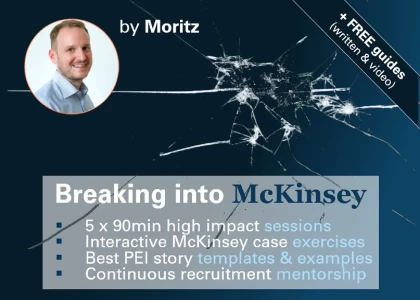For those of you, who have interviewed people especially in candidate led interviews … what is preferred: Issue tree or conceptual framework for the beginning of the case?
There is a lot of conflicting advice out there!
For those of you, who have interviewed people especially in candidate led interviews … what is preferred: Issue tree or conceptual framework for the beginning of the case?
There is a lot of conflicting advice out there!


Hi there,
First of all, any well structured conceptual framework can look like an issue tree. There’s just one major difference with regards to the “issues”:
The above distinction is hugely important because I often ask candidates for concrete ideas and get a generic structure, which is inadequate.
Anyways, what’s the difference between conceptual frameworks and issue trees in your view? Let me know and maybe I can provide a better answer!

Hello,
thanks a lot for the question. :)
I would say the issue tree is the preferred way to structure the case. There are 3 main reasons for that:
1) Higher flexibility → Since it is a way of structure your reasoning, it can easily be adapted to every kind case
2) Higher effectiveness in testing a specific preliminary hypothesis → It allows to build a structure more tailored to the specific business case and to the hypothesis you are testing
3) Better impression with the interviewer → It gives the positive impression that the candidate has a good business sense and he/she is not using the same framework for every case
Having saying that, I think it is important to clarify the things in common and the main differences between the issue tree and the conceptual framework (e.g., profitability framework):
Things in common
Differences
To conclude, I would strongly suggest to practice in the creation of very effective and specific issue trees. It is a good way to convey a strong positive impression to the interviewer at the beginning of the case. And as we all say… there is not a second chance to make a first good impression :)
Do not hesitate to reach out me in case of further questions! I am currently offering a free coaching session.
Good luck!
Matteo

Hi there,
From my point of view, neither.
Ideally you should apply first principles thinking here and develop a muscle to actually think through the cases individually rather than relying on set frameworks. It's obviously harder, but it's a not only a sure bet for the interview, it's also good training for the actual job when you'll get to do it.

Hi there,
Quite frankly you should do the one that you are most comfortable with!
That said, I prefer a framework because you don't really have time to do a proper full issue tree. Additionally, if you do your framework right, it should “sound” like an issue true (each sub-bucket has a purpose/flow). If you're just listing out words/ideas you're doing frameworking wrong!










